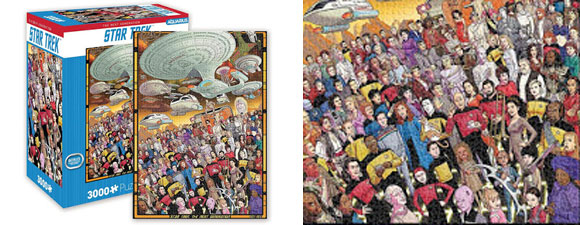Retro Review: Phantasms
7 min readWhen Data initiates a dreaming program, he sees terrifying images of the crew and ship which seem to parallel their mechanical problems.
Plot Summary: Data has a nightmare in which a group of miners are dismantling a plasma conduit and attack him when he interferes. He tells LaForge, who is in the process of bringing the ship’s new warp core. When they start up the new warp core, the ship’s power drops, which LaForge blames on the new warp plasma conduit being out of alignment. While he repairs it, Data initiates another dream session, this time seeing Crusher drinking out of Riker’s head with a straw and himself slicing a cake made from Troi’s body while a telephone rings in the background. He is woken by the real Troi, who says that they were unable to rouse him for several minutes. Concerned when scans reveal no problems with his positronic net, Data visits the holodeck, where a holographic Sigmund Freud tells him that the knife represents his repressed sexual inadequacies. Certain that Freud has no useful advice for him, Data returns to engineering, where he is disturbed that a brace coil looks like the knife from his dream and when he sees a waking vision of a mouth on LaForge’s neck. He hears the telephone ringing and opens his own chest to answer it; Freud tells him to kill them all before it’s too late. Troi asks Data to shut down the dream program for a while so he doesn’t become obsessed with his own subconscious workings, but the next time he sees her, Data stabs her with the brace coil. Under questioning, he explains that he saw a mouth on her shoulder and describes the straw he saw coming out of Riker’s head. Picard relieves him of duty. When Crusher examines Troi, she discovers an interphasic creature attached to her skin where Data stabbed her, then finds more such creatures on every crewmember. Guessing that the creatures must be affecting Data too, Picard has LaForge hook Data’s dream program up to the holodeck, where the three move together through Data’s dream in which he first slices the cellular peptide cake made from Troi’s body, then leads the captain and engineer to Freud’s office, where Freud suggests they answer the insistent telephone before the miners burst in and kill Freud, then go back to dismantling the conduit. Data shrieks, which causes the miners pain and makes them stop. Now understanding the dream, Data asks LaForge to have his positronic subprocessor emit a high frequency pulse. The pulse kills off the creatures feeding on the crew, and LaForge realizes their presence had prevented the new warp core from coming online.
Analysis: A basic plot summary of “Phantasms” overlooks its most enjoyable elements: a subplot about Picard wishing for a way to get out of attending the Starfleet admirals’ banquet, a substantial guest appearance by Data’s cat Spot, and several moments of comic relief provided by Worf, who enjoys cellular peptide cake with mint frosting but doesn’t like cats and absolutely despises jazz music. “Phantasms” is a nearly perfect bottle show – though the action takes place entirely within the claustrophobic confines of a few rooms and corridors on the Enterprise, with the dream images repeated several times, it has seamless pacing and spiraling action wrapped within Data’s attempts to understand his own character.
Though the bulk of the story focuses on Data’s character – first the question of whether he has developed a subconscious capable of sending his conscious mind a message, and then the unsettling suggestion that perhaps violent and antisocial thoughts have been programmed as an innate part of his makeup – it’s a lovely LaForge episode too, in which we get to see some of the tedium of being chief engineer even for someone who thinks a warp plasma reaction is a thing of beauty. LaForge is dealing with an ensign who has a crush on him, an impatient captain, and a science officer and good friend who seems to be flaking out at crucial moments; while at first the ensign seems so young and adoring that it’s quite uncomfortable to watch, veering into a stereotype of teen adulation, she redeems herself by distracting Picard just when the captain is about to make a nuisance of himself trying to help his crew get the warp engines working.
Surprisingly, it isn’t LaForge who first suspects that there might be a connection between Data’s nightmares and the problem with the warp core, considering how quickly he’s usually attuned to Data’s mechanical issues. We can see that the chief engineer is under a lot of pressure from the bridge and from the high expectations of his own subordinates, and his grace under pressure is very much in evidence here. LaForge counts his life out in hours – two hours to repair the warp plasma relay, three hours to repair the power converter, an hour to program the holodeck, six hours to rebuild the conduit. If he sleeps or dreams, we never see when.
Even Data is willing to accept that sometimes a dream is only a dream, even for an android who’s relatively new to the experience. If Spot can have anxious dreams even though Spot has never hunted a rodent or been chased by a canine, Data assumes he can, too, though as Troi points out, he has a tendency to try to diagnose himself when there are people on the ship who might be able to help him. How typical of Data to visit Sigmund Freud after Troi’s casual comment that Freud called dreams the royal road to the mind’s knowledge, rather than asking Troi to elaborate on how that might apply to Data’s own experience.
The Freud sequence following the dream sequence is quite funny in large part because it’s so predictable that Freud will imply that the big knife is a phallic symbol and that Data’s real problem is that he wants to kill his father and possess his mother, even though Data doesn’t have a “mother” and is not programmed to feel sexual desire. But Troi doesn’t try to pick apart the specific images in Data’s dreams, either, thinking that Data has become overly obsessed with his own inner workings – she finds it amusing when he is excited to learn he may have a neurosis. It isn’t until Crusher realizes that Troi’s stab wound has an infestation that anyone stops to think about the ways Data is not like everyone else, how his brain works in fundamentally different ways from theirs.
I love watching Data’s process of trying to become more human, which makes a wonderful contrast with Worf’s efforts not to become too human, scolding Riker for introducing his son to the horrible cacophony that is jazz music and regarding Data’s pet with dread, particularly when told that in addition to having to feed Spot, Worf must say that Spot is a pretty cat and a good cat…Worf who doesn’t realize that he can’t order Spot to come here. Though Data’s decisions are supposed to be completely logical, he does seem irritated at Freud’s inadequacy and upset that he has hurt Troi.
It’s also enjoyable to see Picard made to squirm, first because he has been invited to the admirals’ banquet (“My condolences,” says Riker), then because the admirals have caught on to his reluctance and aren’t buying his excuses concerning the warp core, which leads to a rare instance of Picard sticking his nose in and second-guessing the engineers. He’s quite effective interpreting Data’s dream images – better than Freud, at least, though why don’t they bring Troi in for the holodeck excursion into Data’s mind? But it’s a good thing he’s not a meddler like Jellico, or there would be a lot more fraying tempers and personal misunderstandings on his ship.
If the episode has a flaw, it’s that Picard and Data are so quick to kill off the interphasic aliens rather than to do what Freud first suggests, to answer them…to learn what they need and figure out whether there might be some way to provide it that won’t lead to the cellular decay of the entire crew. I’m not sure whether the aliens seem intelligent only because Data’s dream images portray them that way, but they seem to be methodical and possibly in communication with each other, which would qualify them as a new life form worth studying, if the urgency were not focused less on the crew’s condition than on getting Picard to his banquet before the admirals figure out he’s been trying to find a way to blow them off.






